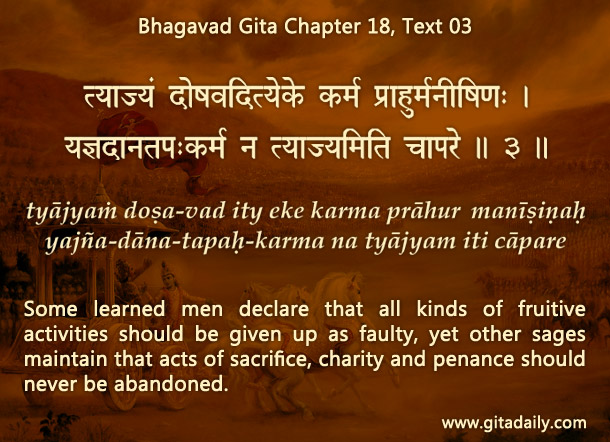“How can we best deal with our disagreers?” The Bhagavad-gita (18.03) offers a healthy model. Here Krishna states the position of those who recommend renunciation of work – a position that he clearly disapproves later (18.05–06). Yet he refers respectfully to the renunciation advocates as manishinah (great thinkers).
Krishna’s example is in direct contrast to the general human tendency of mixing the issue with the person.
That Krishna offers such respect to his disagreers is extraordinary and exemplary for many reasons. Firstly, it is in direct contrast to the general human tendency of mixing the issue with the person and letting disagreement about issues degenerate into disrespect towards the disagreer. Secondly, he is not talking about differences on issues that are inconsequential, but about serious philosophical issues that will have grave individual and social consequences – and yet he doesn’t use that consequentiality to justify launching into an ad hominem attack on his opponents. Thirdly, he is God himself, the omniscient person, the supreme authority. Still he doesn’t draw on his godhood to tear apart his opponents. He sees the good in them, for they are deliberating life’s ultimate questions – the best way out of bondage – even if they come with up an incorrect answer.
No doubt, Krishna does elsewhere use strong words such as mudha (asinine) to refer to those who rigidly and rabidly hold on to erroneous and disastrous views, but that is not so much for their positions as for their dispositions – their incorrigible close-minded obstinacy in holding on to their misconceptions. And his castigation is motivated by consummate compassion – Krishna stays constantly in the hearts of even such people, waiting and working for their reformation.
We have neither the position nor the compassion of Krishna. And we can’t know for sure the disposition of our disagreers. So given our limitations, it’s best that we not imitate his castigatory tone, but follow his conciliatory example.


Didn’t srila prabhupada did the same thing, by using words like mudha and rascals against his philosophical opponents that is being mentioned here not to do in your article , since we cannot be as compassionate as krishna .how to understand this?
Prabhupada was immensely compassionate like Krishna – who else could have gone across vast oceans in old age, alone and penniless, risking his life to save people whom he had never met before in his life?
When we can love like Prabhupada, then we can rebuke like him too.
ys
ccdas
Hare Krishna dear prji
Pamho agtsp. Another gem of an article. Krishna in the Gita is playing the role of Jagadguru who loves all his shishyas and wants only the best for his students the difference between a human guru and krishna being krishna never gives up on his shishyas and has unlimited patience. We all never found our school teachers even strong words offensive and we often relish and recollect those scoldings from our favorite teachers with nostalgia. So krishna should be looked upon as our favorite teacher. And as this article points out krishna is most respectful at times when he plays the role of philosopher and referring to philosophical opponents and uses stronger words when he plays the role of a teacher.
Ys
Subash
Hare Krishna prabhuji,
This article very much corresponds to the popular saying of Jesus Christ ‘Hate the sin, not the sinner’. Interesting to know this mood of Krishna in speaking these verses. Usually not thought of before.